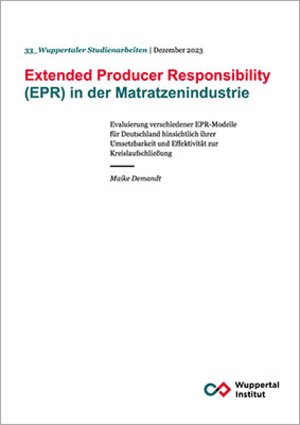Extended Producer Responsibility (EPR) in der Matratzenindustrie
Evaluierung verschiedener EPR-Modelle für Deutschland hinsichtlich ihrer Umsetzbarkeit und Effektivität zur Kreislaufschließung

In Germany, over seven million used mattresses are disposed of every year, most of which are incinerated and only a fraction of which are recycled. This linear approach puts a strain on resources, increases emissions and poses environmental risks. To meet these challenges, extended producer responsibility (EPR) can serve as an instrument for implementing a circular economy. This master's thesis therefore examines the following question: How should an EPR system for mattresses in Germany be designed in order to close material loops efficiently? At the same time, this thesis aims to identify the associated requirements and challenges in the implementation of such a system.
To answer the research questions, three EPR models were developed with the help of expert interviews and a comprehensive literature review and evaluated on the basis of selected criteria. The results of the evaluation showed that a model should be preferred in which a so-called Producer Responsibility Organization (PRO) takes over the responsibility of the manufacturers. Among other things, such a system would enable appropriate monitoring and create incentives for research and development in the field of recycling technologies and the circular design of mattresses. Although the data on used mattresses and their recycling in Germany is currently still limited and the results presented here depend on the chosen methodology, this master's thesis serves as an initial basis for the further development of an EPR system for mattresses in Germany.
Maike Demandt:
Extended Producer Responsibility (EPR) in der Matratzenindustrie
Evaluierung verschiedener EPR-Modelle für Deutschland hinsichtlich ihrer Umsetzbarkeit und Effektivität zur Kreislaufschließung
Wuppertal 2023, ISBN 978-3-946356-36-3
(Wuppertaler Studienarbeiten zur nachhaltigen Entwicklung no. 33)
